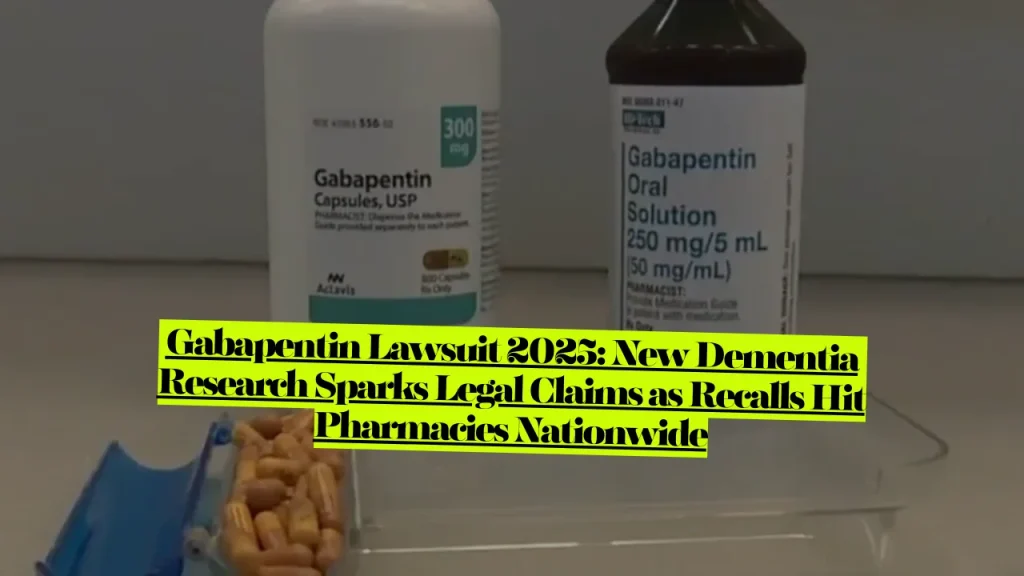Gabapentin Lawsuit 2025, New Dementia Research Sparks Legal Claims as Recalls Hit Pharmacies Nationwide
What You Need to Know About Gabapentin Lawsuits Right Now
If you’re taking gabapentin (brand name Neurontin) for nerve pain or seizures, here’s what’s happening in 2025:
The Dementia Connection: Receiving six or more prescriptions of gabapentin for low back pain is associated with a 29% increased risk of developing dementia and an 85% increased risk of mild cognitive impairment within 10 years, according to research published in July 2025.
Who’s Most at Risk: Risks more than doubled in adults aged 35-49, and the more prescriptions patients received, the higher their cognitive risks became.
The Recalls: Multiple gabapentin recalls hit pharmacies throughout 2025, including an October Class II recall for 100mg capsules due to elevated unknown impurities discovered during stability testing.
Past Legal Settlements: Pfizer previously paid $325 million to third-party payors and $190 million to direct purchasers in class action settlements for illegally marketing Neurontin for unapproved uses and delaying generic competition.
Current Status: No new mass tort litigation has been filed specifically for dementia claims in 2025, but ongoing lawsuits continue targeting Stevens-Johnson Syndrome and Toxic Epidermal Necrolysis—severe skin reactions with mortality rates reaching 50% for TEN.
Here’s the gut-punch nobody saw coming: By 2019, gabapentin became the seventh most prescribed drug in America, and postmortem toxicology tests found it in nearly 10% of all overdose deaths in 2019-2020. Doctors embraced it as the “safe” alternative to opioids. Pharmaceutical companies marketed it as non-addictive. Yet off-label uses accounted for more than 90% of the drug’s $2.7 billion in worldwide sales—prescriptions for conditions the FDA never approved. Now, emerging research links frequent gabapentin use to cognitive decline in patients as young as 35, and pharmacies are pulling contaminated batches from shelves. For millions who trusted their doctors and filled these prescriptions, the question isn’t just “Can I sue?”—it’s “How did this happen again?”
The Shocking Dementia Research Everyone’s Talking About
In July 2025, Case Western Reserve University researchers analyzed 26,416 adults with chronic low back pain through the TriNetX national database, comparing gabapentin users to non-users matched for demographics, existing conditions, and other pain medications.
The findings sent shockwaves through the medical community:
Adults aged 35-49 who were prescribed gabapentin had a 244% increased risk of dementia and a 350% increased risk of mild cognitive impairment compared to those not taking the drug.
Patients with 12 or more prescriptions were 40% more likely to develop dementia and 65% more likely to develop MCI than those prescribed gabapentin only 3-11 times.
This isn’t the first warning. A 2023 Taiwan study tracking 206,802 patients found gabapentin users had a 45% increased dementia risk, with younger patients (under age 50) facing the highest danger—a hazard ratio of 3.16.
Related Lawsuit: Erin Andrews Lawsuit Latest Update, Secretly Filmed Naked in Hotel—How She Won $55M and Changed Privacy Law Forever

What Is Gabapentin and Why Was It Prescribed So Widely?
The FDA approved Neurontin in 1993 for treating epilepsy-related partial seizures and postherpetic neuralgia caused by shingles.
But pharmaceutical company Parke-Davis (later acquired by Pfizer) trained staff to promote it for at least 11 off-label uses, including bipolar disorder, migraines, restless leg syndrome, and alcohol withdrawal seizures.
The illegal marketing scandal: In 2004, following a U.S. Justice Department investigation, Pfizer pleaded guilty to criminal illegal marketing charges and paid a $430 million fine.
Whistleblower Dr. David Franklin, who received $24.6 million under whistleblowing legislation, detailed how Pfizer suppressed study results, planted people in medical audiences, lavished perks on doctors, and used psychological profiling to push gabapentin to blockbuster status.
The FDA Recalls You Need to Know About
October 2025 Recall: Major Pharmaceuticals recalled multiple lots of 100mg gabapentin capsules (lots M04950 through M05386, expiring January 2026-February 2027) after stability testing revealed elevated unknown degradation impurities.
April 2025 Recall: Sun Pharmaceutical Industries recalled 13,728 bottles of gabapentin (12,876 bottles of 300mg and 852 bottles of 400mg) due to cross-contamination concerns.
March 2025 Recall: Sun Pharmaceutical initiated a Class III recall for 300mg and 400mg gabapentin capsules in various bottle sizes distributed nationwide due to cross-contamination.
The 2014 Warning Sign: Aurobindo Pharma USA voluntarily recalled gabapentin supplies in 2014 because manufacturing defects resulted in some bottles containing empty capsules.
Past Lawsuits and Settlements: What Happened?
The Antitrust Cases:
Direct purchasers claimed Pfizer violated federal antitrust laws by illegally delaying generic gabapentin entry through improper FDA patent listings, sham litigation, and fraudulent representations to patent courts.
In April 2012, Pfizer settled for $190 million with consumers who purchased Neurontin between December 2002 and August 2008.
A separate $325 million settlement covered third-party payors including insurance companies, health benefit providers, and union health plans.
The Stevens-Johnson Syndrome Cases:
Ongoing litigation targets severe skin reactions with mortality rates of 25-50% for Toxic Epidermal Necrolysis, with 80-90% of reactions occurring within the first two months of treatment.
The FDA’s 2019 Respiratory Warning
In December 2019, the FDA issued an urgent Drug Safety Communication after receiving nearly 50 reports of respiratory problems with gabapentin, including 12 deaths.
The warning specifically targeted patients with risk factors including opioid use, CNS depressant medications, COPD, and severe lung diseases.
Can You Sue for Gabapentin-Related Injuries?
Proving a case requires:
Causation—medical records documenting gabapentin use and expert testimony linking the medication to your condition while ruling out other causes.
What compensation might cover:
- Medical expenses including hospitalization and ongoing treatments
- Lost wages from inability to work
- Pain and suffering
- Long-term care costs
- Cognitive rehabilitation
Time limits matter: Statutes of limitations typically range from one to three years from either the injury date or when you discovered the harm.

Frequently Asked Questions About Gabapentin Lawsuits
Is there a class action lawsuit for gabapentin dementia in 2025?
No new mass tort or class action has been filed specifically for dementia claims as of November 2025. However, individual cases may be developing as the July 2025 research gains attention.
What are the most common gabapentin lawsuit claims?
Current litigation focuses on Stevens-Johnson Syndrome, Toxic Epidermal Necrolysis, and severe skin reactions. Past settlements involved illegal marketing and antitrust violations.
How do I know if my gabapentin was recalled?
Check your prescription bottle for lot numbers and expiration dates, then compare them to FDA recall lists. Major recalls in 2025 affected lots HAD1458A, HAD2718A, HAD3432A, HAD1712B, HAD1712C, and M04950 through M05386.
Can I still file a claim from the 2004 Pfizer settlement?
No. The settlements applied to purchases made between December 2002 and August 2008, with claim filing deadlines long expired.
What should I do if I’m experiencing memory problems on gabapentin?
Report symptoms like memory loss, confusion, or slowed thinking to your prescribing physician immediately. Physicians should incorporate routine cognitive assessments for gabapentin patients.
Is gabapentin addictive?
Yes. The FDA added new warnings in May 2025 about withdrawal symptoms including seizures, depression, suicidal ideation, anxiety, and confusion. Patients must taper gradually over minimum one week.
What Doctors Should Be Doing Differently
Texas Medical Board rules require physicians prescribing gabapentin to: obtain accurate medical history, perform comprehensive physical examinations, conduct medication reconciliation to minimize reaction risks, and provide appropriate informed consent.
The 2025 dementia research concludes: “Our results support the need for close monitoring of adult patients prescribed gabapentin to assess for potential cognitive decline.”
The Bottom Line: Should You Be Worried?
Expert Dr. Martin Prince from King’s College London cautions that “confounding and reverse causality are tenable explanations for the observed effects,” noting that observational studies cannot prove gabapentin causes dementia.
However, multiple large-scale studies across different populations now show consistent associations between gabapentin use and cognitive decline, with risks increasing alongside cumulative doses.
If you’re currently taking gabapentin:
- Don’t stop abruptly—withdrawal can trigger seizures and serious psychiatric symptoms
- Schedule cognitive assessments with your doctor
- Discuss alternative treatments if concerned
- Report any memory problems immediately
- Check if your medication was recalled
If you’ve suffered injuries:
Contact a pharmaceutical litigation attorney immediately to evaluate your case before statutes of limitations expire. Document all medical records, prescriptions, and symptoms.
The gabapentin story isn’t over. As dementia research accumulates and recalls continue, the gap between what doctors were told about this “safe” alternative and what patients actually experienced keeps widening. Whether you’re seeking compensation for past injuries or trying to understand current risks, one thing is clear: trust your symptoms, question your prescriptions, and don’t wait to seek legal advice if something feels wrong.
Related Legal Resources:
- Learn about product liability and defective drug claims
- Understand pharmaceutical class action settlements
- Explore FDA recall procedures and patient rights
About the Author

Sarah Klein, JD, is a licensed attorney and legal content strategist with over 12 years of experience across civil, criminal, family, and regulatory law. At All About Lawyer, she covers a wide range of legal topics — from high-profile lawsuits and courtroom stories to state traffic laws and everyday legal questions — all with a focus on accuracy, clarity, and public understanding.
Her writing blends real legal insight with plain-English explanations, helping readers stay informed and legally aware.
Read more about Sarah
